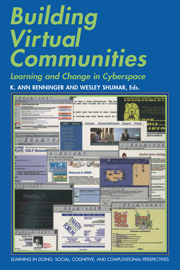Book contents
- Frontmatter
- Contents
- List of Tables and Figures
- Contributors
- Series Foreword
- Preface and Acknowledgments
- Foreword: Virtual Communities for Learning and Development – A Look to the Past and Some Glimpses into the Future
- Building Virtual Communities
- Introduction: On Conceptualizing Community
- Part One Types of Community
- 1 The Mystery of the Death of MediaMOO: Seven Years of Evolution of an Online Community
- 2 Female Voices in Virtual Reality: Drawing Young Girls into an Online World
- 3 Community Building with and for Teachers at The Math Forum
- 4 Learning in the Virtual Community Depends upon Changes in Local Communities
- Part Two Structures and Community
- Part Three Possibilities for Community
- Afterword: Building Our Knowledge of Virtual Community: Some Responses
- Afterword: Building, Buying, or Being There: Imagining Online Community
- Index
- References
4 - Learning in the Virtual Community Depends upon Changes in Local Communities
Published online by Cambridge University Press: 12 November 2009
- Frontmatter
- Contents
- List of Tables and Figures
- Contributors
- Series Foreword
- Preface and Acknowledgments
- Foreword: Virtual Communities for Learning and Development – A Look to the Past and Some Glimpses into the Future
- Building Virtual Communities
- Introduction: On Conceptualizing Community
- Part One Types of Community
- 1 The Mystery of the Death of MediaMOO: Seven Years of Evolution of an Online Community
- 2 Female Voices in Virtual Reality: Drawing Young Girls into an Online World
- 3 Community Building with and for Teachers at The Math Forum
- 4 Learning in the Virtual Community Depends upon Changes in Local Communities
- Part Two Structures and Community
- Part Three Possibilities for Community
- Afterword: Building Our Knowledge of Virtual Community: Some Responses
- Afterword: Building, Buying, or Being There: Imagining Online Community
- Index
- References
Summary
In this chapter, a virtual community is defined as a group of people whointeract with each other, learn from each others' work, and provide knowledge and information resources to the group related to certain agreed-upon topics of shared interest. A defining characteristic of a virtual community in this sense is that a person or institution must be a contributor to the evolving knowledge base of the group and not just a recipient or consumer of the group's services or knowledge base. Members and the community as a whole take advantage of information technologies and telecommunications for these purposes, in addition to face-to-face interactions they may have. The notion of learning as applied to a virtual community means that there is a mutual knowledge-building process taking place. Members learn both by teaching others and by applying to their own situations the information, tools, know-how, and experiences provided by others in the virtual community. In contrast, a local community is a group of people and organizations who have common interests, concerns, and mutual interdependence by virtue of their living and working in a geographic locality under a common government. In both of the case studies discussed in this chapter, efforts were made to strengthen local communities through applications of information technologies and telecommunications.
Learning and change in the virtual community is increasingly interdependent with learning and change in the participants' local institutions and local communities. This is a fundamental difference from earlier virtual communities.
- Type
- Chapter
- Information
- Building Virtual CommunitiesLearning and Change in Cyberspace, pp. 96 - 126Publisher: Cambridge University PressPrint publication year: 2002
References
- 20
- Cited by

